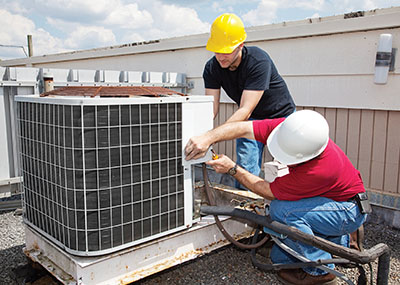Benefits of HVAC recommissioning programs for retailers.
It is no secret that retailers heavily invested in brick-and-mortar-based operations must find more paths to financial efficiency to compete with the robust growth of retailers operating within electronic commerce. For example, think Best Buy versus Amazon. While Amazon operates shipping facilities and large distribution networks around the nation, and they will be increasing these operations with the recent announcement of same-day delivery service, big box retailers like Best Buy have added substantial operating costs with their large, physical retail centers. While plenty of strategists and logistical experts are working to create improved operating margins in product sales, energy efficiency is quickly becoming a measurable and critical component to their retail stores’ bottom line.
One way retailers can achieve increased energy efficiency is through the recommissioning or tune-up of their commercial HVAC units. The purpose of a recommissioning program is to introduce effective and efficient ways to reduce energy and utility costs for facility management teams. The program, which also allows retailers to reap the financial benefits of utility-based rebates, promotes sustainable operations and reduces carbon footprints.
In April 2010, a major big box retailer participated in a case study of the benefits of recommissioning the HVAC systems at nine of its Florida locations. This accounted for roughly 25% of the retailer’s Florida-based operations. At the conclusion of the study, it was determined that the retailer had reduced its stores’ carbon footprint by using less electricity. As a result, this reduced utility expenses for the retailer, and by bringing the HVAC units up to optimum performance, the frequency of service calls was also reduced and the lifecycle of their units were increased. Increased comfort levels on the sales room floor were also achieved, leading to more comfortable and extended encounters between sales staff, products and customers.
 During the time period that the case study took place, field technicians conducted rooftop inspections on seven retailer’s locations throughout Central and Southern Florida. A total of 93 HVAC units were recommissioned, which involved a thorough inspection of the individual units and an instant analysis of each unit by using a handheld device.
During the time period that the case study took place, field technicians conducted rooftop inspections on seven retailer’s locations throughout Central and Southern Florida. A total of 93 HVAC units were recommissioned, which involved a thorough inspection of the individual units and an instant analysis of each unit by using a handheld device.
The handheld device measures two pressures and three temperatures in order to accurately assess air conditioner health and performance. Internal and external (ambient air) temperatures are measured using a series of sensors attached to the device. Using an internal proprietary computer program, the device determines refrigerant pressure and temperatures to instantly compare the unit’s current operational status to original factory settings, while making a diagnosis on problems and solutions to bring the unit back to peak performance.
Test results from the handheld device are stored in the unit and uploaded to a server by the field technician for immediate presentation to the retailer. This also creates a benchmark for future maintenance checks and performance analysis.
As result, the projected annual energy savings for the seven Florida retail locations in this case study was valued at $35,987. Based on the stores’ location within the local utility company’s coverage area, one store qualified for an additional $3,270 rebate, proving an additional incentive for the recommissioning program. This type of reward is a growing national trend as utility companies increasingly recognize the energy saving benefits and reward retail customers for recommissioning. Energy efficiency for all HVAC units in the case study increased to the mid and upper 90 percentile range. Additionally, capacity for all of the units increased into the 90 percentile range.
Through recommissioning programs, retailers, customers and utilities are seeing the benefits from sustainable solutions that are less harsh on operating systems and energy consumption. Sustainable solutions that ease the demand for energy but also provide financial benefits will play increasingly important roles for both energy utilities and retail facility management teams well into the future.
— Mark Barraclough is president of Alpine Mechanical Services, LLC, a green, technology-focused HVAC provider specializing in servicing the retail industry in 11 states across the East Coast. For more information, email [email protected].
